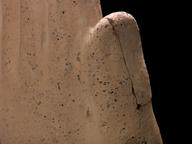

Plaster replica of a Greek relief, throned Asklepios
- Made:
- 1860-1920; circa 460 BCE in Greece
- maker:
- Thrasymedes
Plaster replica of a Greek relief, showing Asklepios (Asclepius; Latin: Aesculapius) seated on a throne, original is work of Thrasymedes of Paros, around 460 BC, cast 1860-1920
Several sources claim that Asclepius was first a physician hero, who was later recognised as the Greek god of healing and medicine with a cult that spread in the 5th century BCE. Various sanctuaries in his name were built throughout Greece as areas of worship and refuges for the ill. These were hospital-like places where priests guided patients through rituals of purification and medical curative practices, regularly involving snakes as part of the healing process.
Asclepius is usually represented as an old, bearded man, leaning on a heavy staff with a single snake coiled around it, known as the ‘Rod of Asclepius’. The staff of Asclepius (not to be mistaken for a caduceus) was soon associated with healing, becoming, throughout the ages, an established emblem of medicine and curative methods.
Details
- Category:
- Classical & Medieval Medicine
- Collection:
- Sir Henry Wellcome's Museum Collection
- Object Number:
- A654558
- Materials:
- plaster
- credit:
- Gillieran, M.




